Introduction: From Rising Costs to Rising Knowledge

remember standing with my father on our ancestral farm in Azamgarh, watching the dry winds sweep through the parched field.
“Everything is getting expensive,” he said, rubbing the soil between his fingers. Seeds, urea, diesel—everything was burning holes in small farmers’ pockets. Like so many Indian farmers, he had learned farming by experience, not textbooks.
But in today’s world, knowledge is the new fertilizer, and those who stay updated can survive even the harsh climate or market shocks.
If you’re a young farmer, an agriculture student, or even someone who dreams of returning to your roots to grow food naturally, you’ve probably Googled organic farming courses online.
But not everyone can afford college-level training or time away from the farm.That’s where free organic farming courses online in India come in—not just as educational tools, but as lifelines.
Let’s explore how these courses can turn your smartphone into a virtual classroom and your farm into a future-ready, sustainable business.
Why Organic Farming Needs Strong Foundation – And Where You Can Build
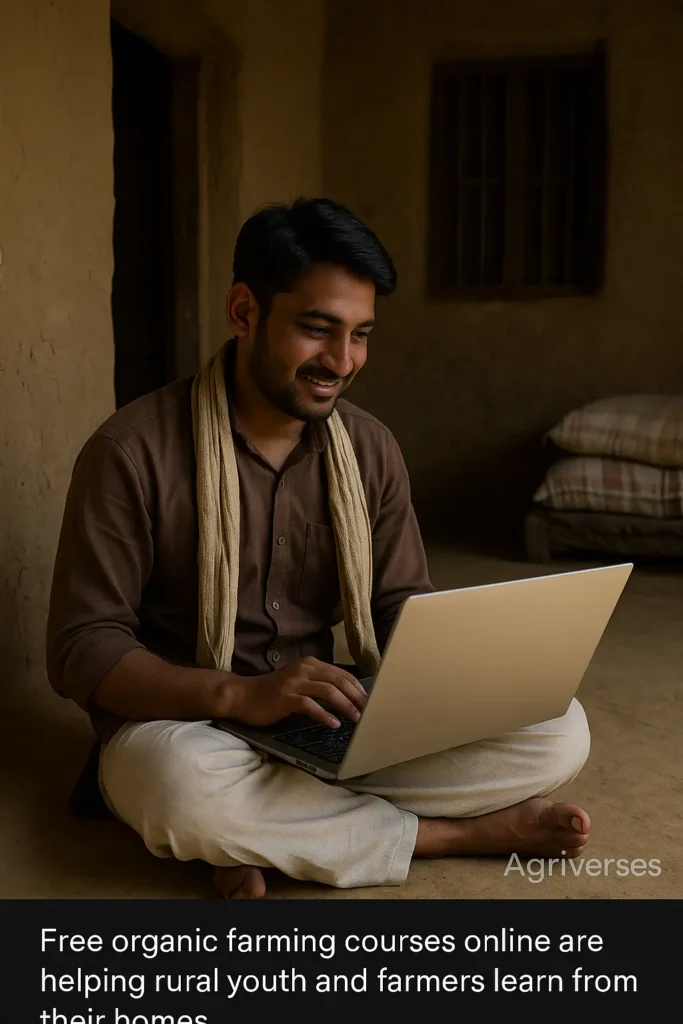
It for Free organic farming is not just about skipping chemicals. It’s a mindset. A commitment to soil, to health, and to long-term sustainability.
But without understanding compost science, natural pest control, or certification processes, many farmers end up confused or misled by half-baked YouTube advice.
Thankfully, today’s digital India offers a growing number of free organic farming courses online—many in regional languages, with video tutorials, PDF guides, and practical modules.
Institutes like ICAR, Krishi Vigyan Kendras, and even private NGOs now offer certificate-level training for free.
These aren’t just “courses”—they are bridges between grassroots experience and expert-backed practices.
If you’re looking for offline or government-recognized training, check out this article: Top Organic Farming Courses in India.
Top Free Platforms for Organic Farming Courses
1. SWAYAM
An initiative by the Government of India, SWAYAM provides a plethora of courses tailored for the Indian context.
One notable offering is the Organic Farming Practices and Certification course by Dr. Harisingh Gour Vishwavidyalaya, Sagar. Spanning eight weeks, it delves into composting, vermicomposting, biofertilizers, and the nuances of organic certification.
The course is designed to enlighten farmers, students, and professionals about sustainable practices and the benefits of organic farming.
2. eSkill India
Under the aegis of the National Skill Development Corporation (NSDC), eSkill India offers a diverse range of courses.
While not exclusively focused on agriculture, the platform provides valuable resources on sustainable practices, financial literacy, and digital skills, all of which are crucial for modern farmers navigating the organic landscape.
3. NPTEL
The National Programme on Technology Enhanced Learning (NPTEL) offers the course Organic Farming for Sustainable Agricultural Production, curated by IIT Kharagpur.
This eight-week program covers ecological principles, biodiversity, and organic matter recycling, aiming to equip learners with the knowledge to design resource-efficient farming systems.
Best Paid & Certified Courses Online
While free courses provide a solid foundation, some farmers and agri-enthusiasts seek more structured, in-depth programs. Here are some notable paid options:
1. Rocket Skills
Based in Gurgaon, Rocket Skills offers an online organic farming course facilitated by Mr. Kiran Bhaskaran.
The course spans 4 to 8 weeks and is available in both Hindi and English. It includes video lectures, live Q&A sessions, and a certificate upon completion.
The platform emphasizes practical skills, making it ideal for those looking to implement organic practices on their farms.
2. IGNOU’s Certificate in Organic Farming
In collaboration with the Agricultural and Processed Food Products Export Development Authority (APEDA), IGNOU offers a six-month distance learning program.
Priced at ₹4,800, the course covers hands-on skills, certification requirements, and marketing strategies for organic produce.
It’s tailored for individuals who have completed at least the 12th grade.
3. Coursera & Udemy
These global platforms host a variety of courses on organic farming. Coursera, for instance, offers programs from institutions like the University of Wageningen, focusing on soil ecology and organic food systems.
Udemy provides courses on topics like rooftop organic gardening and DIY organic pesticides, catering to both beginners and seasoned farmers.
In addition to free options, the government also offers sponsored offline training programs – here’s the complete breakdown: Free Govt Organic Farming Training.
Scientific Insight: Why Organic Inputs Work
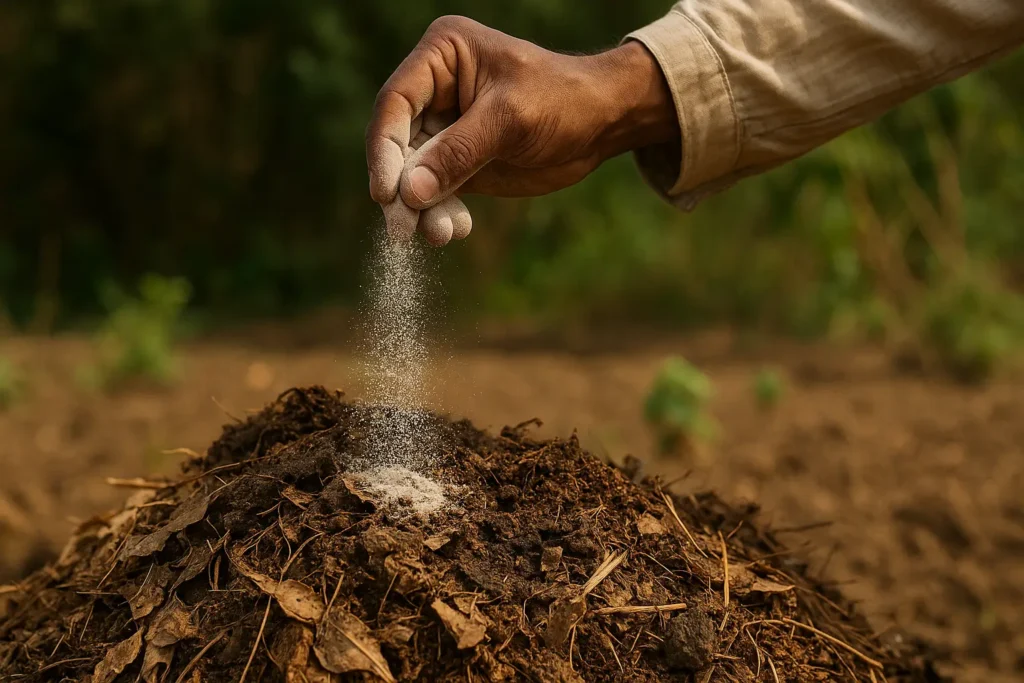
Let’s take a simple example: compost.You might hear that compost is good for the soil.
But why? In scientific terms, compost is rich in humus, which enhances soil structure, improves moisture retention, and fosters microbial life.
When you apply compost, you’re not just feeding the plant—you’re feeding trillions of microbes like Trichoderma, Azotobacter, and Rhizobium that build soil health from the ground up. These microbes help fix nitrogen, fight pathogens, and unlock nutrients.
Similarly, biofertilizers, vermicompost, and neem-based pesticides work not by brute force like chemicals but by supporting nature’s systems. But to use them effectively, you need to learn ratios, timings, compatibility, and crop-specific practices.That’s exactly what well-structured online organic farming courses can teach you.
Digital Gurukuls:
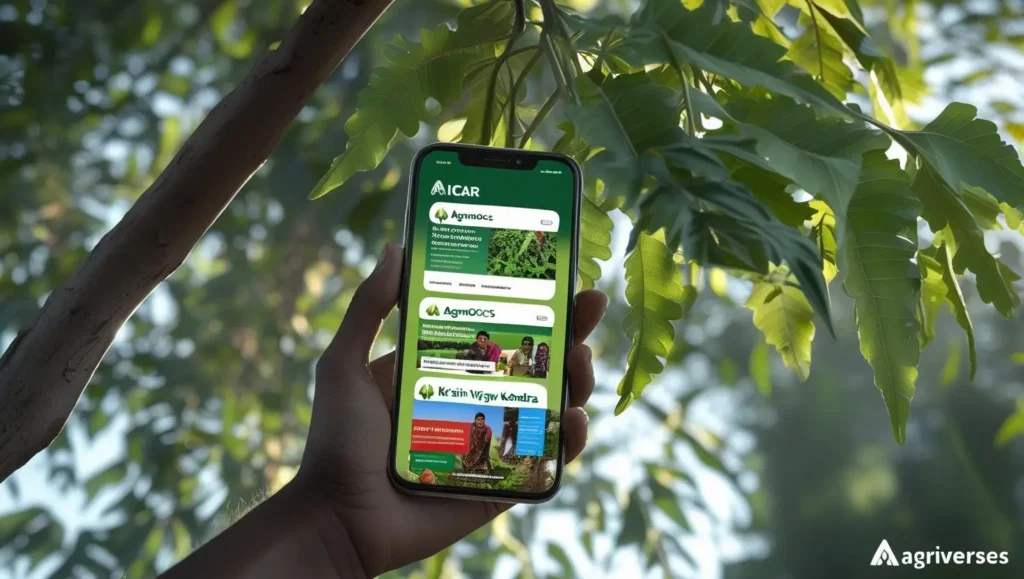
Top Places Offering Free Organic Farming Courses Online in India. One of my cousins in Punjab, Jaskaran, was struggling with pests in his organic brinjal crop.
He found a free course on NAARM’s e-learning portal, and within weeks, he had made his own fermented buttermilk pesticide. That’s the power of access.
Here are some platforms every farmer and agri-enthusiast should explore:
- ICAR – Indian Council of Agricultural Research offers free e-learning on organic inputs, soil health, and natural farming. here is source link
- KVKs (Krishi Vigyan Kendras) regularly host webinars and downloadable content on organic techniques in regional languages. Check your district KVK website.
- NCOF (National Centre of Organic Farming) provides technical bulletins and PDFs on composting, certification, and market linkage. Source
- AgMOOCs platform has online courses like “Organic Farming for Sustainable Agriculture” in partnership with IIT Kanpur and NAARM. Source
- YouTube + WhatsApp Courses – Many KVKs and NGOs like Sahaja Samrudha now run WhatsApp-based learning groups, where short videos and assignments are sent weekly.
The best part? These resources are free, mobile-friendly, and often multilingual—a real blessing for farmers from UP, Bihar, Tamil Nadu, or even the tribal belts.
Beyond Just Learning – Certification, Market Access & Community Support
Now, imagine this: you’ve learned how to compost, manage weeds naturally, and grow toxin-free crops. But what’s next?That’s where certification and community marketing come in.
Many of these free online organic farming courses include introductory guidance on PGS (Participatory Guarantee System)—India’s low-cost organic certification model.
It allows smallholders to form groups and self-certify under national standards.
Some NGOs and startups like Organic India Foundation even help connect certified farmers with urban markets or FPOs (Farmer Producer Organizations).
So, these courses aren’t just about technique—they’re your first step into a growing ecosystem of organic trade, branding, and consumer trust.
If your online course is helpful for you in your startup idea? Check this out: Project Ideas for Organic Farming
From Knowledge to Field:
Stories That Prove Online Learning WorksLet’s talk about Lakshmi, a widow from Telangana who lost her husband during COVID. She had half an acre and zero formal training.
Through a WhatsApp group run by a local NGO, she learned to make jeevamrut, grow leafy greens, and sell them in nearby gated communities.
Today, she earns ₹15,000–₹18,000 a month—not just income, but dignity. Her story is one of thousands.
Or
take Vishal, an agriculture student in Bihar, who used free ICAR modules to start a community seed bank. His college now recommends these courses to every student.
The message is clear: with a smartphone and intent, anyone can enter the organic farming space.
If This Inspired You…If you found this valuable, do share it with fellow farmers, students, or your village WhatsApp group.
Many people still think good education needs big money—but that’s changing.
Want more such insights? Follow Agriverses or explore our Organic Farming series to keep learning, growing, and thriving.
What’s Next for Indian Farmers? – A Greener, Smarter Rural Future
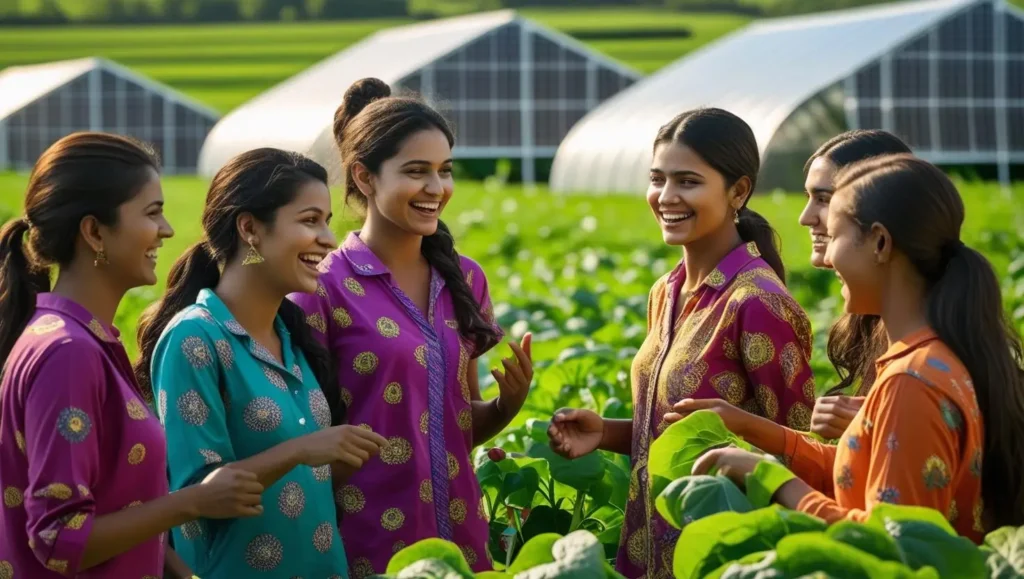
We’re standing at a turning point.
With climate change, soil fatigue, and pesticide-linked diseases rising, organic farming is no longer a luxury—it’s a necessity. But for that, knowledge must reach every field, not just elite agri colleges.
Free organic farming courses online in India are a quiet revolution. They’re empowering women, youth, even retired workers who want to return to the land.Imagine a future where our farmers use local cow dung to nourish the soil, use microbes to boost yields, and access premium organic markets—all while learning from their phones.
That’s the future Agriverses dreams of:
a Bharat where tradition meets technology, and every field becomes a classroom of resilience.—Let’s not wait for someone to come teach us. Let’s become the learners, the doers, and the changemakers.
Because in the words of my Dadaji, “Padhoge toh badhoge, kheti ho ya zindagi.”
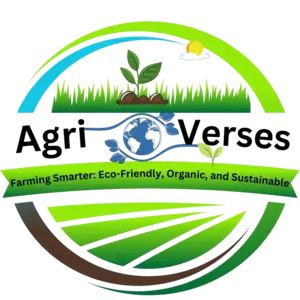
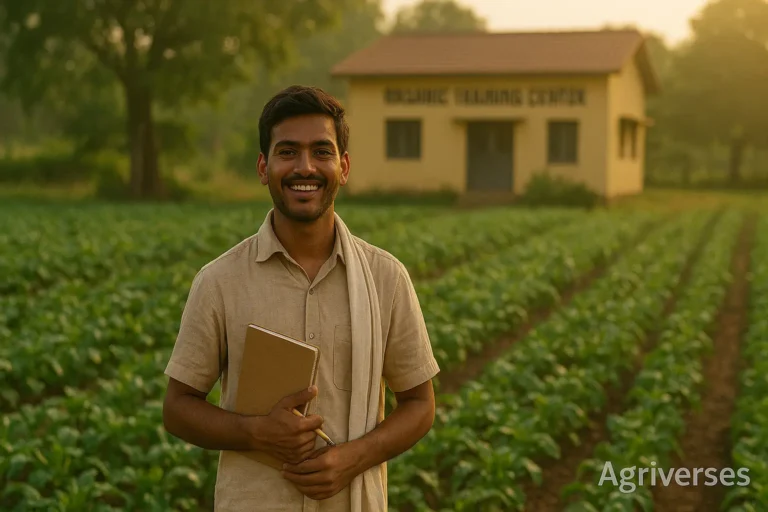
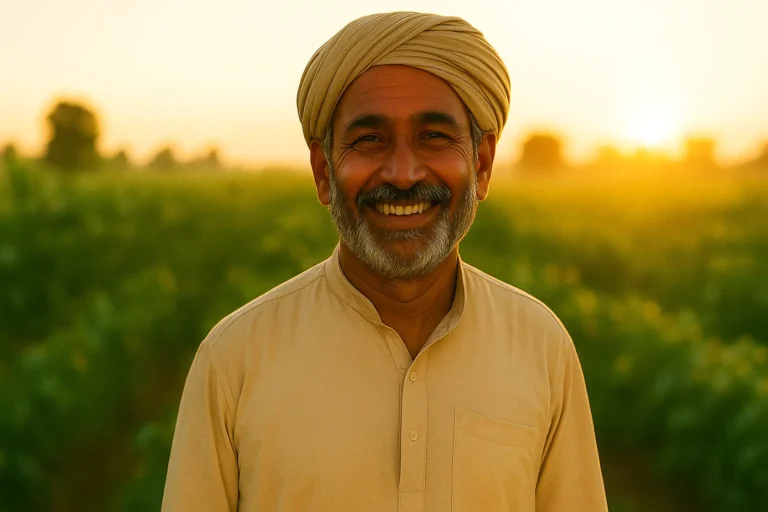
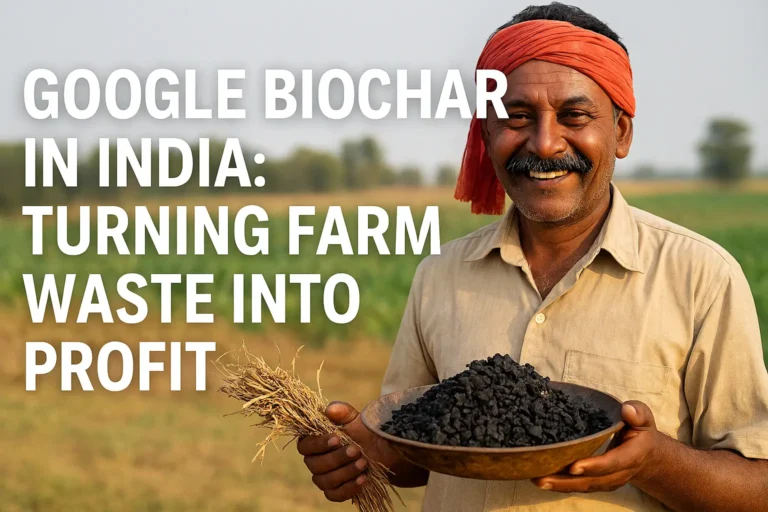
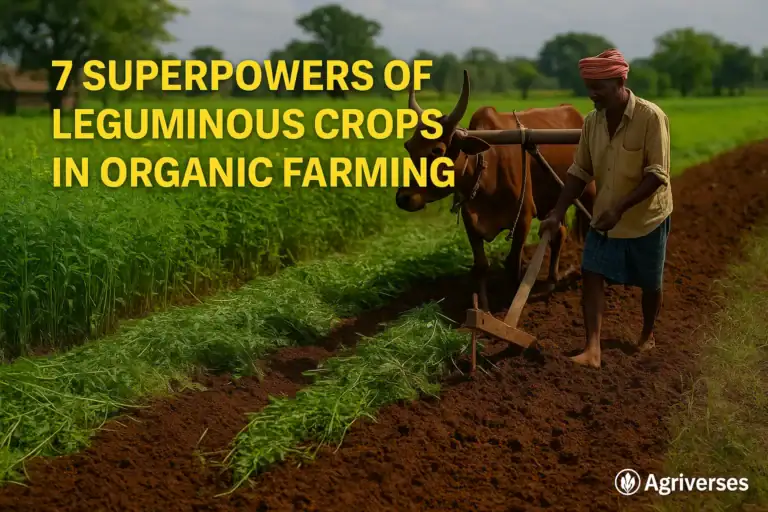
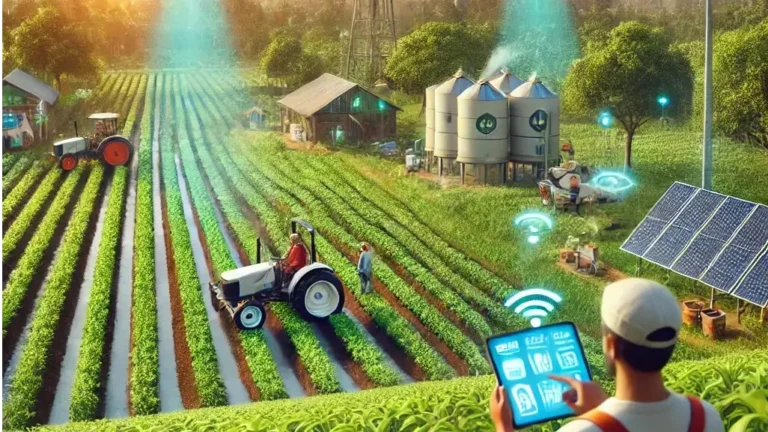

2 Comments